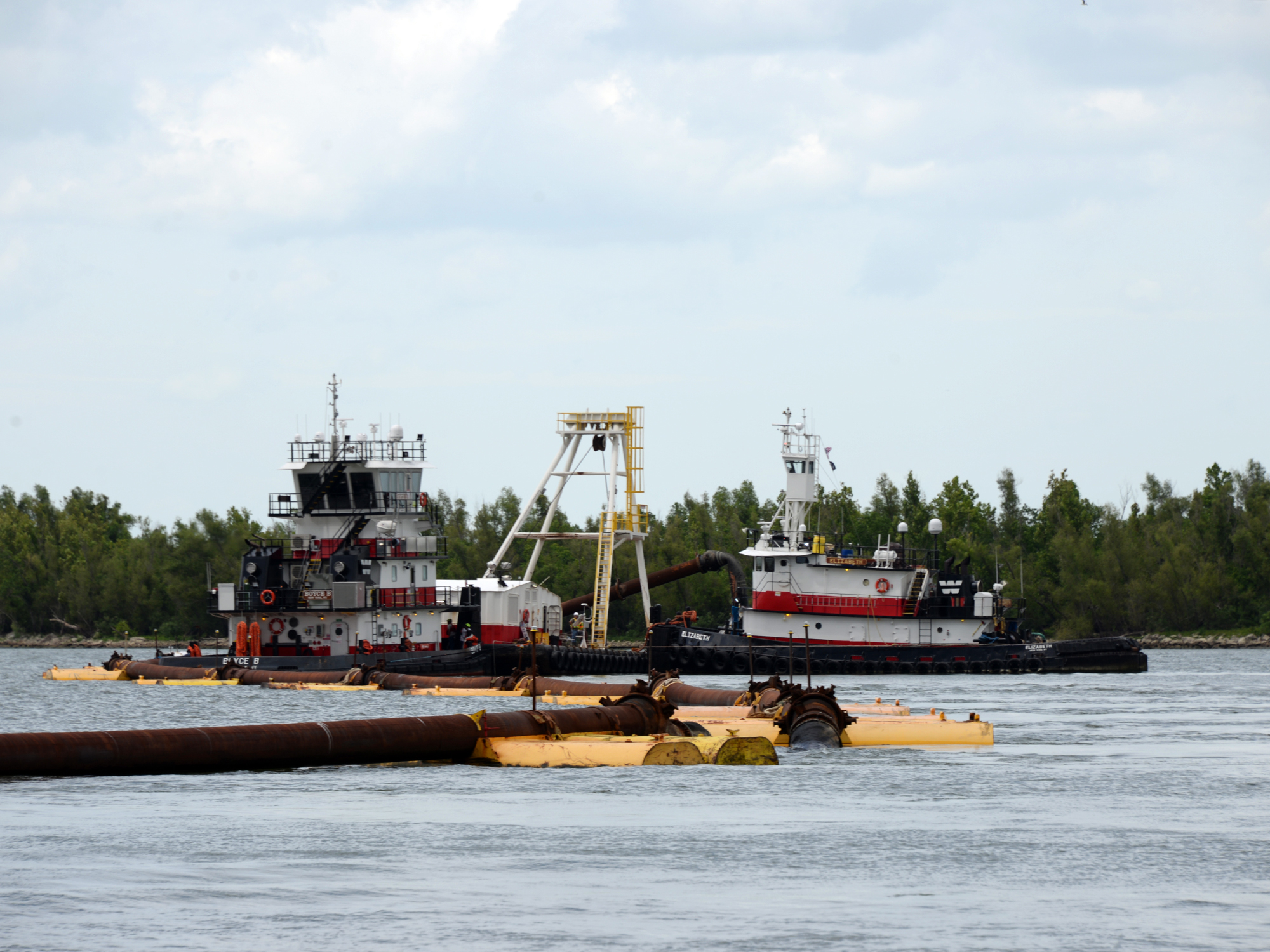Minnesota's drought contributes to drinking water crisis downriver

Earlier this summer, the U.S. Army Corps of Engineers constructed an underwater sill to try to prevent saltwater intrusion. Low water flow due to drought means the Gulf's saltwater is moving upriver, threatening New Orleans' drinking water supply and already impacting communities farther south. (Photo by USACE)
A Gulf-borne mass of saltwater is quietly advancing upriver from the mouth of the Mississippi and threatening the drinking water supply of thousands of Louisianans. And this "slow-motion disaster," as Grist described it, is directly connected to the stubborn, severe drought that has afflicted Minnesota and the Upper Midwest.
The dense wedge of saltwater, facing little resistance from the Mississippi's stunted freshwater flow, has pushed further and further upriver and is now about 25 miles from New Orleans. It is creeping ever closer to critical water intakes — a point that would trigger a potential public health crisis.
To learn more, we spoke with Matt Rota of Healthy Gulf, a nonprofit working to strengthen environmental justice and protection in Louisiana and the lower Mississippi basin. As you'll read in our Q&A below, Matt and his community don't have the luxury of managing one crisis at a time, but they still find rays of hope in the effort. (This Q&A has been edited for length and clarity.)
Peter LaFontaine of FMR: Matt, thanks for helping us better understand what's happening with the saltwater wedge. Are there particular communities whose drinking water is more at risk, or is this a problem for the whole New Orleans area?
Matt Rota of Healthy Gulf: This mess isn't new, but the media didn't really pick it up until it started threatening New Orleans. There are communities farther south on the river that have been dealing with saltwater for months, and they also dealt with it last year, too.
Many of the communities on the river are disproportionately African American and other people of color. These are also populations with shorter life expectancy, higher incidences of heart disease, and other markers of low income and social marginalization.
Peter: Is there anything we can do to prevent this from becoming a regular phenomenon? How can we build resilience into our systems?
Matt: What we really need from y'all is rain, so get working on that! We need 10 inches of rain from the Midwest right now — that would be enough to start pushing the saltwater wedge back.
When it comes to long-term resiliency, the farm landscape of the Midwest has these extensive drainage systems that are designed to get the water off the ground as quickly as possible. It would make a big difference if we changed that to make sure the water is being held in the ground as long as possible, which would buffer against both droughts and floods.
It's a human-made disaster in another respect: A few years ago, Congress authorized the Army Corps of Engineers to increase dredging in the river channel from Baton Rouge to the mouth of the Mississippi River for the shipping industry. The channel was maintained at a 45-foot depth, but now it's increased to 50 feet. And the Corps said, "This will increase saltwater intrusion."
Now, this has happened twice in two years, which isn't enough to confirm a pattern. But given all the impacts of climate change, like sea level rise and drought, you can see where this is heading.
Peter: How did extreme low water levels impact the Mississippi River diversion proposals that aim to pipe Mississippi River water to the desert Southwest?
Matt: I'm pretty skeptical of the feasibility of all those proposals, but money talks. People look at the Mississippi River and say, "Look at how much water is there!" It's like, well, yeah, it's a big river, but it needs to perform many functions. The current situation is bad, but can you imagine if we were already piping out a significant chunk of the Mississippi somewhere up above Baton Rouge?
Peter: I'd rather not. How do you stay positive or motivated while trying to solve big problems in the Gulf?
Matt: It is challenging working on the Gulf Coast, I'm not going to lie. We're on the front lines of so many environmental disasters and injustices, from chemical and petroleum development to sea level rise to hurricanes, even stuff like this.
But it feels like the social tide is changing. There are so many amazing scientists, activists and community members down here who inspire me. And we've also had some important victories.
Now, they don't look like the wins that you might get in California or New York or other progressive states. But you know, this is where the fights need to be fought, and there are the people that have been here for a long time, who are so passionate about where they live and making sure that it's taken care of. And it's great to see new people coming down here to reinforce that.
Peter: We live in the headwater state here in Minnesota. Is there anything else you want people up here to know about the issue?
Matt: I marvel at the complexity and interconnectedness of this ecosystem, and if we're connected, that means we have an impact on how people are doing in another part of the Mississippi River. It's really important that folks in Minnesota understand that — how connected we really are by this waterway — because that's how we learn to be better stewards of this amazing resource.
* * *
To learn more about Healthy Gulf and support their work, visit healthygulf.org or find them on Twitter, Facebook and Instagram @healthygulf.
Become a River Guardian
Sign up and we'll email you when important river issues arise. We make it quick and easy to contact decision-makers. River Guardians are also invited to special social hours and other events about legislative and metro river corridor issues.